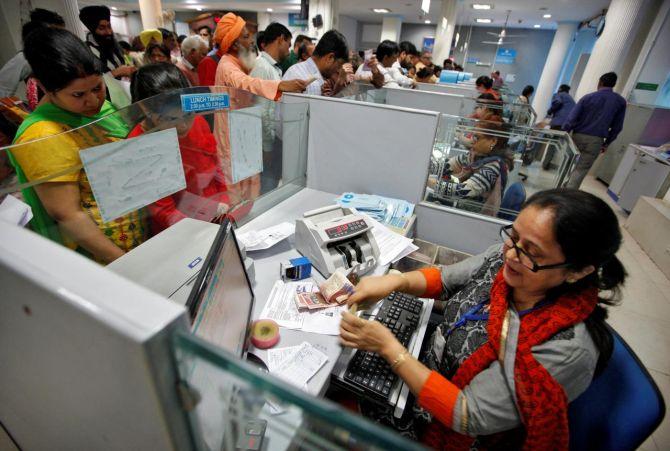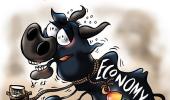RBI said the improvement in asset quality was driven by state-run lenders which saw a drop both in both GNPA and in the net NPA ratios.

As the bad loan recognition process nears completion, the health of the banking system has improved with the gross non-performing loan ratio remaining stable at 9.1 per cent as of September-end, the same level as in FY19, according to the RBI.
However, the numbers indicate major improvement on a full-year basis, as in FY18 the ratio stood at a high of 11.2 per cent and slipped to 9.1 per cent in FY19, the RBI said in its annual report on trends and progress of banking in 2018-19.
Reflecting the improvement in the health of the banking system, net NPAs nearly halved to 3.7 per cent in FY19 from 6 per cent in FY18.
"The gross NPA ratio of all banks declined in FY19 (to 9.1 per cent from 11.2 per cent in FY18) after rising for seven consecutive years, as recognition of bad loans has neared completion," RBI said in the report released on Tuesday.
The numbers remained stable at 9.1 per cent in September quarter of the current fiscal as well, the regulator added.
The central bank said the improvement in asset quality was driven by state-run lenders which saw a drop both in both GNPA and in the net NPA ratios.
Decline in the slippage ratio as well as a reduction in outstanding gross NPAs helped in improving the GNPA ratio.
While the gross NPAs of public sector banks improved to 11.6 per cent in FY19 from 14.6 per cent in FY18, net NPAs stood at 4.8 per cent from 8 per cent during this period.
During the same period, private sector banks' gross NPA deteriorated to 5.3 per cent from 4.7 per cent, net NPAs stood at 2 per cent compared to 2.4 per cent, primarily driven by the massive NPA pile at IDBI Bank, which after the takeover by LIC has been reclassified as a private sector lender.
"The deteriorating asset quality of private sector banks in terms of the GNPA ratio is due to the reclassification of IDBI Bank as a private bank, effective January 21, 2019," the report said.
It, however, said after excluding IDBI Bank, private sector banks' gross NPA ratio declined.
IDBI Bank's NPA ratio stood at 29.4 per cent in FY19.
On sectoral basis, gross NPA in bank lending to the agriculture sector increased in FY19 as well in the first half of FY20.
An internal working group constituted by the RBI to review agricultural credit indicated that NPA levels increased in those states which announced farm loan waivers in FY18 and in FY19.
Gross NPAs in the industrial sector remained high at 17.4 per cent, constituting about two-thirds of the total dud loan pile at the end of September 2019, the report said.
Further, the report said the proportion of standard assets in total advances of commercial banks increased in FY19, largely because of the improved performance of state-run banks.
NPAs in the lager accounts, with exposure of Rs 5 crore and above, had contributed 91 per cent of total GNPAs in FY18 after the RBI withdrew various restructuring schemes.
In FY19, banks recorded a synchronised decline in all special mention accounts (SMA-0, SMA-1 and SMA-2), restructured standard advances and gross NPAs, attesting to the broad-based improvement in asset quality.
"Yet, these accounts, which constituted 53 per cent of gross loans and advances, contributed 82 per cent of GNPAs as of March 2019," the report said.
It said the number of stressed accounts rose among both private as well as public sector banks in the first half of FY20.
In FY19, recovery of stressed assets improved, propelled by resolution under the bankruptcy code, which contributed to more than half of the total amount recovered.
The report said cases referred for recovery under various mechanisms grew over 27 per cent in volume and tripled in the value during the year, leading to a pile-up of bankruptcy proceedings.
While cases referred for recovery through legal mechanism shot up, cleaning up of balance sheets through sale of bad loans to asset reconstruction companies decelerated annually and declined as a proportion of GNPAs in the beginning of FY19, the report said.
Photograph: Ajay Verma/Reuters










